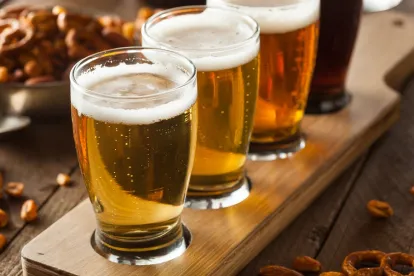The US District Court for the Northern District of California’s recent opinion in Broomfield v. Craft Brew Alliance, Inc., No. 17-cv-01027-BLF (Sept. 1, 2017) represents the latest decision in the now long-line of false advertising cases alleging that beer brands misrepresent their geographic origins.
The Broomfield case involves the marketing of Kona beers, allegedly in a manner that deceptively suggests that the beers are brewed in Hawaii. In fact, all packaged Kona beer and all draft Kona beer sold outside of Hawaii is brewed in Oregon, Washington, New Hampshire and Tennessee. The Kona brands bear names (e.g., Big Wave, Fire Rock) and images (e.g., volcanoes, palm trees, surfers and hula dancers) that evoke Hawaii. The beers’ outer packaging shows a map of Hawaii and the location of the Kona brewery, and encourages purchasers to “visit our brewery and pubs whenever you are in Hawaii.”
While the court’s recent opinion granted in part and denied in part the Motion to Dismiss filed by Kona brewer the Craft Brew Alliance (CBA), the opinion is a net loss for CBA. Among the opinion’s important points:
-
The court rejected CBA’s position that the marketing at issue is non-actionable “puffery” or is adequately qualified by a clear disclaimer. The opinion notes that if the claims were based solely on imagery and vague statements like “Liquid Aloha,” the court would view such representations as non-actionable puffery. But the map of Hawaii, the Hawaiian address and the invitation to “visit our brewery . . . in Hawaii” constitute specific claims, according to the court, that a reasonable consumer could rely on in making a purchase. Thus, the court denied the motion to dismiss Plaintiffs’ key claims under California’s trio of false/deceptive/unfair advertising statutes.
-
Relying in prior cases involving Red Stripe (Dumas) and Sapporo (Bowring), CBA also argued that its label, which disclosed multiple brewing locations, acted as a sufficient disclaimer to preclude a reasonable consumer from relying on the allegedly misleading statements. The court rejected this position, too, reasoning that: (a) the disclaimer was itself misleading as it included a Hawaii address, when in fact no bottled or canned Kona beer originates in Hawaii; and (b) the disclaimer on bottles and cans was not visible on the outer packaging that the Plaintiffs alleged they relied upon.
-
The court also denied CBA’s motion to dismiss the Plaintiffs’ claims for fraud, intentional misrepresentation and negligent misrepresentation.
-
The court did dismiss Plaintiffs’ claims for breach of express and implied warranties. According to the court, while some of the marketing claims at issue might be found misleading, the claims do not constitute unequivocal statements of fact nor guarantees, and therefore the warranty claims should be dismissed, without prejudice.
-
The court also dismissed Plaintiffs’ claim for injunctive relief. As the Plaintiffs themselves now know that Kona beer is not made in Hawaii, any injunction would do nothing to remedy the harms that they complain of.
-
Finally, the court denied the motion to dismiss the claim for unjust enrichment. The court explained that while the unjust enrichment claim may ultimately be subsumed into Plaintiffs’ other (legal) claims, at the pleading stage the Plaintiffs are allowed to plead a remedy in equity as an alternative to its legal claims.
In short, the Broomfield v. Craft Brew Alliance case, minus a few claims, will proceed to the discovery phase of litigation. The time and expense of that endeavor often persuades defendants to reach a monetary settlement with the plaintiffs.
Following the defendant-friendly Bowring (Sapporo) and Dumas (Red Stripe) decisions, the industry may have hoped that the misleading geographic origin class action wave had crested. In light of Broomfield and the reportedly pro-plaintiff leaning of the judge presiding over the pending false advertising case against Asahi (opinion on the motion to dismiss expected shortly), any hope may have been premature.



 />i
/>i

